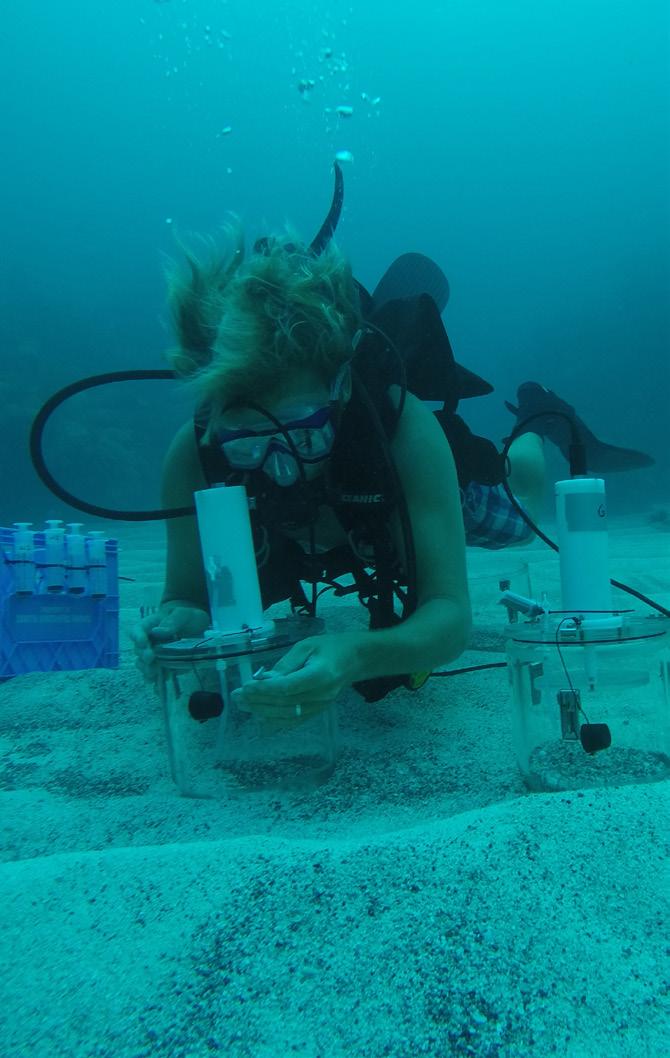
4 minute read
Highlighted Grants: Research That Reaches Further
At Georgia Southern’s College of Science and Mathematics, faculty researchers are securing major grants to answer urgent scientific questions—from climate resilience and drug discovery to global health and environmental restoration. These funded projects fuel student opportunities, advance public knowledge and embody our mission to Soar Beyond—into communities, ecosystems and innovations across the globe.
Training the Next Generation of Coastal Scientists: MROC2S
Led by Checo Colón-Gaud, Ph.D., associate dean and professor of biology, and supported by nearly $3 million from the National Science Foundation, the Mentoring and Research for Careers in Coastal Science (MROC2S) program is preparing post-baccalaureate fellows for careers in coastal and environmental science.
Launched in Fall 2024 with co-principal investigators Asli Aslan, Ph.D., director of the Institute for Water and Health at Georgia Southern University; John Carroll, Ph.D., associate professor of biology; and Lacey Huffling, Ph.D., associate professor of middle grades and secondary education, the program hosts 10 fully funded fellows each year for intensive research, mentorship and professional development. In its first year, MROC2S connected fellows with 11 Biology faculty mentors and professional partners across government agencies, NGOs and universities. Fellows have presented their work at state, regional and national conferences, and several have already been accepted to graduate programs.
MROC2S is a collaboration across departments, drawing leadership from the Institute for Water and Health, the Department of Biology and the Department of Middle and Secondary Education.
Global Disease Research: Ticks in Uganda
Lorenza Beati, Ph.D., and her biology lab have partnered with the USDA-Agricultural Research Service to study tick-borne diseases in Uganda—an ecologically diverse region with underexplored microbial communities.
This project, in collaboration with researchers from Makerere University in Uganda and Salford University in the U.K., aims to build a comprehensive inventory of bacterial, viral and protozoan pathogens carried by Ugandan ticks. By training local scientists and using portable sequencing technologies, the team is strengthening Uganda’s capacity to detect and respond to emerging disease threats.
Environmental sciences Ph.D. student Saviour Dralabu has completed a year of U.S.-based training and is now applying his skills in the field in Uganda.
Understanding Fleas to Protect Public Health
With a four-year NIH R16 grant, Lisa Brown, Ph.D., associate professor of biology, is leading innovative research into the immune system of fleas, notorious vectors of disease in both pets and humans. Her work explores how fleas defend themselves against infection, offering insights that could help prevent transmission of flea-borne diseases such as cat scratch fever, murine typhus and plague.
The grant is also advancing undergraduate and graduate education by funding independent student research in biomedical science.
Targeting Cancer with Migrastatic Compounds
Supported by a $527,000 NIH grant, Associate Professor of Biochemistry, Chemistry and Physics Mark Vincent dela Cerna, Ph.D., and his team are developing new anti-metastasis compounds aimed at PRL3, an enzyme linked to cancer progression. Using computational design and high-throughput screening, the team has already identified several promising molecules and is now advancing to cancer model testing.
Based at the Savannah campus, dela Cerna’s Laboratory of Structural Biology and Drug Discovery is as much about mentorship as it is about medicine. The lab’s motto—“Curiosity leads to cures”—drives a team committed to training the next generation of biomedical researchers.
Green Chemistry for a Cleaner Planet
In collaboration with the Department of Defense, a Georgia Southern team led by Drs. Perez, He and Rowles are tackling environmental pollutants using innovative ionic liquids (ILs)—designer solvents that offer greener alternatives to traditional chemicals.
Key outcomes include:
• Reusable magnetic beads to remove methylene blue dye from water
• ILs that extract carcinogenic PAHs from fossil fuel-contaminated water
• Breakthrough ILs capable of dissolving fluoropolymers like Teflon, enabling safer disposal and metal recovery from military and industrial waste
These projects are pioneering sustainable solutions at the intersection of chemistry, engineering and environmental science.
Training Globally Engaged Coral Reef Scientists
Funded by a National Science Foundation IRES Track II grant, the Advanced Studies Institute (ASI) is an international research program immersing U.S.based graduate students in the ecological complexity of Australia’s coral reefs and rainforests.
Over 21 days, students train at the School for Field Studies’ Centre for Rainforest Studies and Lizard Island Research Station, conducting independent research alongside leading U.S. and Australian scientists. The program blends ecology, physiology, molecular biology and environmental social science to foster a truly transdisciplinary approach.
Now in its third cohort, ASI has trained 25 graduate students and produced publicly accessible blogs, research symposia, and educational resources—all reinforcing the program’s global impact on STEM education and reef resilience. Learn more at www.ires-au.com.








